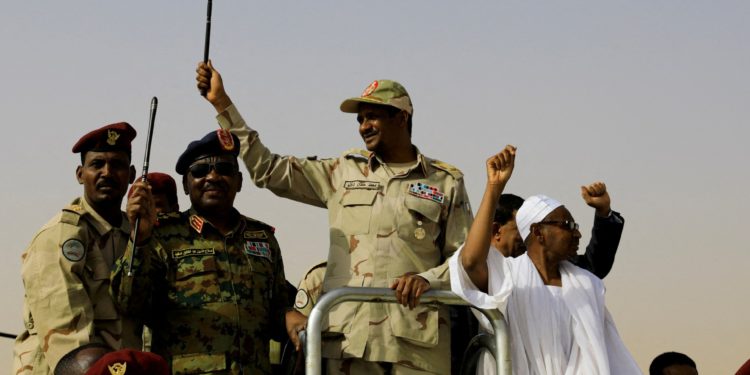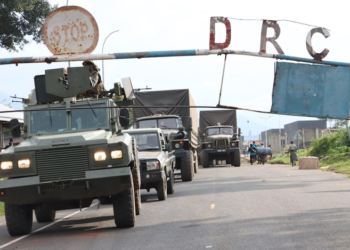By AL JAZEERA
Nine months of civil war between the paramilitary Rapid Support Forces and the Sudanese army have turned Sudan’s capital Khartoum into a plundered, lawless and bloodied shell of its historic self, according to current and former residents.
For months now, the RSF has controlled most of the city, looting markets, homes, warehouses and vehicles. It has also set up hundreds of checkpoints and contributed to reducing entire neighbourhoods to rubble by embedding its fighters in residential areas, which are then indiscriminately shelled and bombed by the army.
“[The checkpoints] have led to a general state of fear and most people are afraid to leave their houses. There’s also a curfew that starts right after sunset,” said Mabrooka Fatma*, a Sudanese activist in the city.
In the weeks after a bitter political dispute between the RSF and the army erupted into war in April 2023, hundreds of thousands of people fled the capital to nearby cities under the latter’s control, but not everybody followed. Some were too poor to leave, while others feared that the RSF would confiscate and loot their homes if they fled. Dozens of activists also stayed behind to help communities affected by the war.
Most people later deemed it too dangerous to leave, even if they wanted to. The RSF had banned civilians from driving vehicles, forcing them to walk or rely on donkey carts to transport daily needs. Khartoum, once vibrant and safe, became a lawless city.
“The treatment [towards civilians] is different from one fighter to another,” Fatma told Al Jazeera. “But the new recruits who come to loot are the scariest. They like to harass people.”
‘It’s revenge’
Most RSF fighters come from nomadic tribes from Darfur and Kordofan, two provinces historically neglected and exploited by political and security elites in Khartoum and surrounding cities.
Many of these tribes fought counterinsurgencies on behalf of the central government to crush mostly non-Arab armed groups, who were rebelling against their political and economic marginalisation.
During the first Darfur war in 2003, government-backed Arab militias – which were more commonly known as the “Janjaweed” and later repackaged as the RSF – displaced non-Arabs from their lands, looted and burned markets and hospitals, and subjected women and girls to sexual violence, according to Human Rights Watch.
The RSF are now committing the same atrocities in Khartoum.
“They came from the far west of the country where there is little electricity and few hospitals … and where they begin to carry guns as children. They don’t have any [political] goal here,” said Nidal Asma,* a young woman still living in Khartoum.
“They love to attack, loot and destroy. It’s revenge,” she told Al Jazeera.
The RSF’s conquest of Khartoum has seen fighters move their families into houses that they evicted or occupied after the owners fled. Fatma told Al Jazeera that four new families moved into her area and introduced themselves to the community. Civilians welcomed them out of fear.
“We all know some fighters. It’s very normalised now because everyone has to deal with them. Otherwise, you’re deemed their enemy and they can pose a danger to you,” Fatma said.
Arsonists posing as firefighters
Civilians living under the RSF rule fear they could be killed or arrested at any moment. On social media, daily stories are reported of RSF fighters committing terrible and senseless acts of violence such as shooting at street children and committing sexual violence.
To distract from their egregious violations, the RSF has deployed “military police” in the streets. Civilians told Al Jazeera that the RSF encourages civilians to report crime in the city, even though their own men are usually the perpetrators.
“The RSF are trying to appear concerned about the security of civilians in order to limit the negative image that they have,” said Mohamad Ahmad*, an activist in southern Khartoum with the local Emergency Response Room, a makeshift clinic that provides first aid to war victims.
Ahmed added that the RSF is usually responsible for randomly detaining young men, ostensibly on suspicion of being army spies. Some are released after their relatives or friends visit RSF police offices, but many are still missing.
Al Jazeera sent written messages to Yousif Ezat, the RSF’s spokesperson, asking him to comment on reports that the paramilitary is terrorising residents in Khartoum but no response was received before publication.
Mustafa Yousif*, an activist who recently fled Khartoum to a city under army control, believes that the RSF is pretending to help civilians to advance its propaganda.
He recalled how the group reacted after the army dropped a bomb on a market in south Khartoum in September, killing 40 people.
“The RSF arrested two victims from the market massacre … because they prevented the fighters from filming and using the death of civilians as propaganda for the war,” Yousif told Al Jazeera.
Desperate to survive
The RSF’s plunder of Khartoum has prompted a major humanitarian crisis, according to aid agencies. In December, the World Food Programme said that the capital risks suffering from “catastrophic hunger” if no assistance reaches civilians.
The army, which controls most aid shipments from its de facto administrative capital in Port Sudan, has exacerbated the hunger crisis by blocking or severely restricting the entry of food and medical aid into areas under the RSF’s control, say activists.
That has caused desperate civilians, who lost everything to RSF fighters, to now rely on the paramilitary for piecemeal handouts.
“[The RSF] now distributes things directly to people and in the streets, such as food and medicine,” Fatma, the activist, told Al Jazeera.
She added that poverty and the constant threat of sexual violence have led to many early marriages. In some cases, parents give up their daughters to RSF fighters out of a belief that rape is less stigmatising under marriage. Other parents have married their daughters off to have one less mouth to feed, in a society where married women are considered the responsibility of their husbands.
Fatma added that most women and girls stay indoors out of fear that they could be the RSF’s next victims.
“We received many cases [of gang rape] by RSF soldiers,” she told Al Jazeera. “The threat of sexual violence is present all the time.
“We cannot trust the Janjaweed.”
*Names changed to protect the identity of civilians who face the risk of violence in Khartoum







Discussion about this post